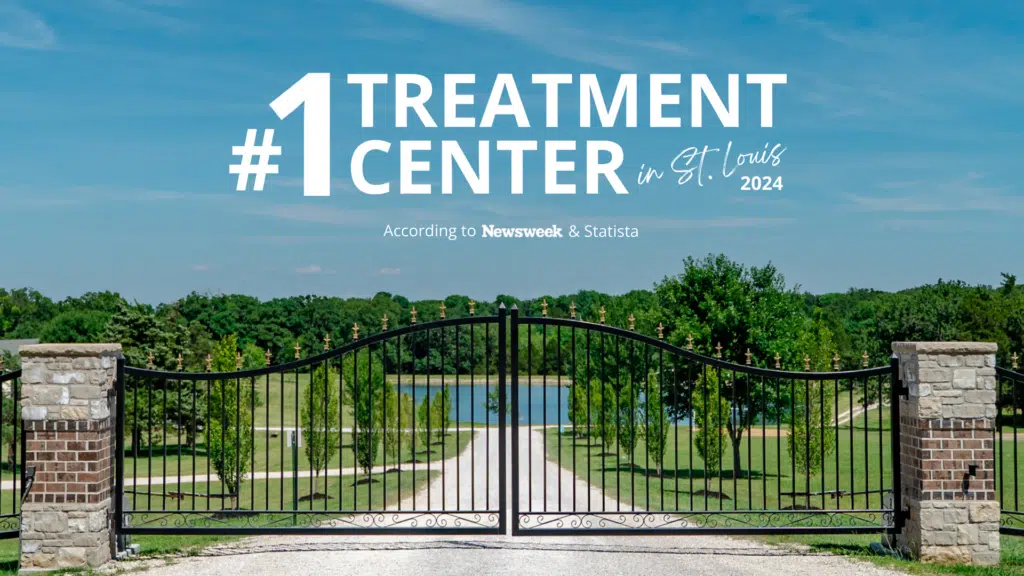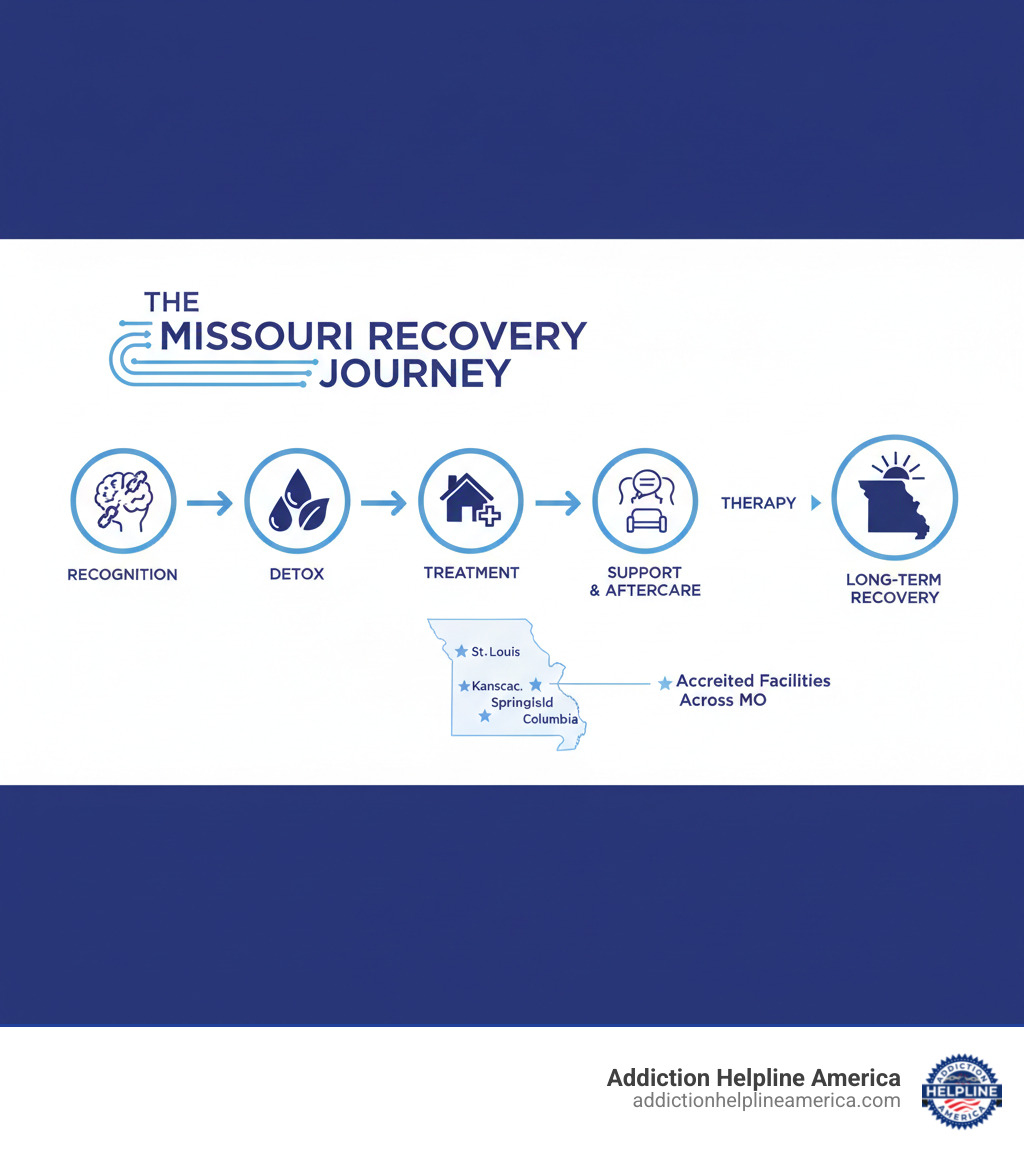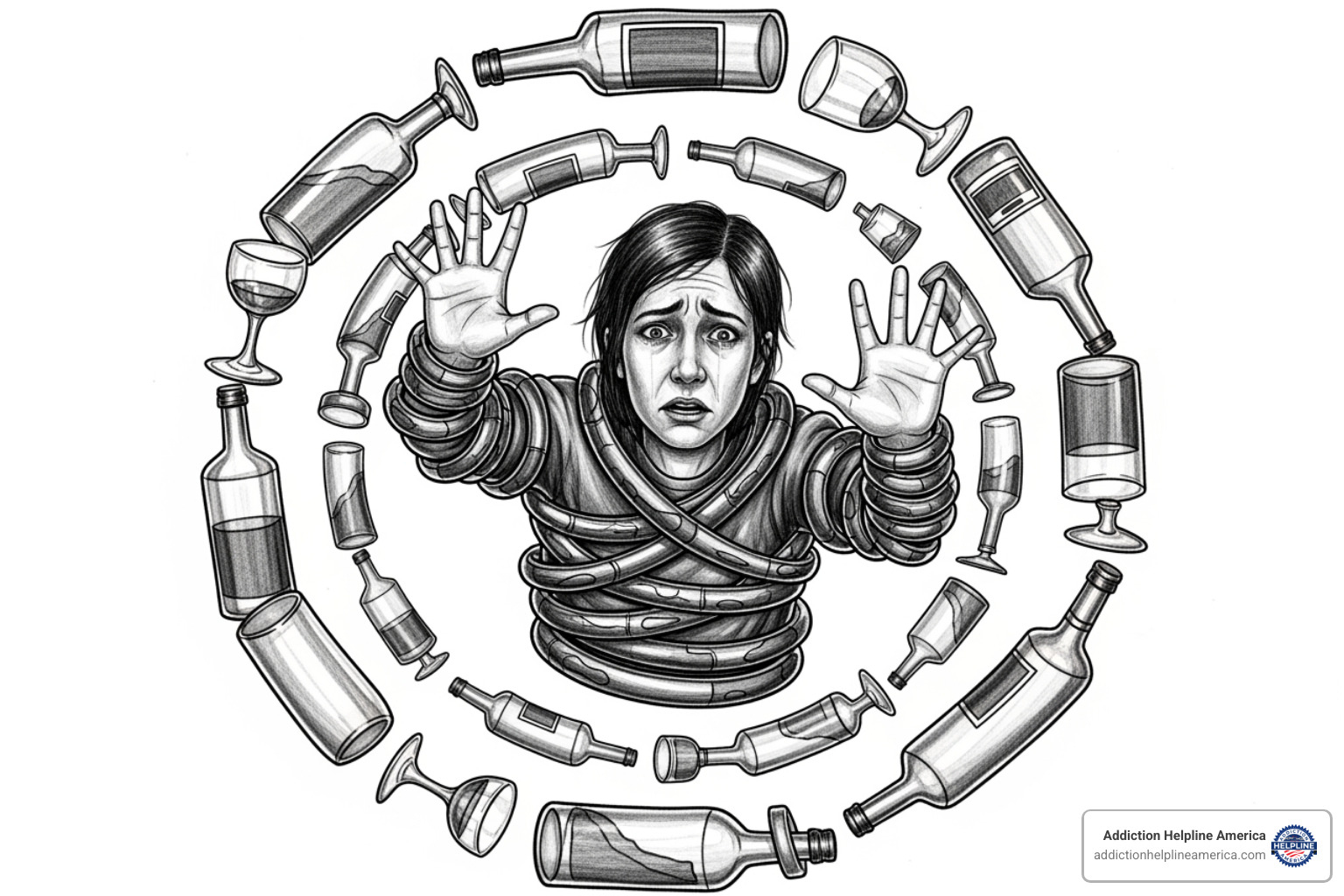
Understanding Alcohol Rehab Options in Missouri
If you’re struggling with alcohol use disorder, Missouri alcohol rehab offers a full spectrum of care, from medical detox to inpatient and outpatient programs. With over 500,000 residents affected by alcohol addiction, the state has a robust network of treatment options.
Key Facts About Missouri Alcohol Rehab:
- 293 substance abuse facilities operate statewide.
- Average residential treatment cost: $56,782.
- Daily costs (uninsured): $630.91 for inpatient, $57 for outpatient.
- Insurance acceptance: 73.4% of facilities take private insurance, 68.7% accept Medicaid.
- Levels of care: Medical detox, inpatient/residential, partial hospitalization (PHP), intensive outpatient (IOP), and standard outpatient.
- Specialized programs: Available for veterans, women, adolescents, LGBTQ+ individuals, and those with a dual diagnosis.
Recovery is possible. Accredited treatment facilities are located in cities like St. Louis, Kansas City, Springfield, and Columbia, offering everything from medically supervised withdrawal to flexible outpatient services.
This guide will help you understand the types of Missouri alcohol rehab programs, services, costs, and how to find the right fit. At Addiction Helpline America, our specialists offer free, confidential guidance 24/7 to connect you with treatment programs that match your unique needs.
Recognizing the Need for Alcohol Rehab in Missouri
Recognizing the signs of alcohol use disorder is the first step toward recovery. It often develops slowly, blurring the line between social drinking and dependency. If you’re concerned about yourself or a loved one, paying attention to these changes is crucial.
Common Signs of Alcohol Use Disorder
Alcohol addiction manifests differently for everyone, but common patterns often emerge. Look for these signs:
- Increased tolerance: Needing more alcohol to achieve the desired effect.
- Withdrawal symptoms: Experiencing tremors, nausea, anxiety, or sweating when trying to stop. Severe withdrawal can cause seizures and delirium tremens, making medically supervised detox essential.
- Cravings: Intense, overwhelming urges to drink that disrupt daily thoughts and activities.
- Loss of control: Drinking more than intended or for longer periods despite promises to cut back.
- Continuing to drink despite consequences: Persisting with alcohol use even when it harms relationships, work performance, or health.
- Neglecting responsibilities: Letting obligations slide at home, work, or school in favor of drinking.
- Social withdrawal: Giving up hobbies and avoiding friends or family to spend more time drinking.
- Failed attempts to quit: Trying to stop or reduce drinking multiple times without success. This indicates a need for professional support.
Finding Immediate Help in a Crisis
If you or someone you know is in immediate danger, get help now. These resources are available 24/7:
- 988 Suicide & Crisis Lifeline: Call or text 988 for free, confidential support for any mental health, suicide, or substance use crisis.
- 911: Call immediately for any life-threatening emergency, including severe withdrawal symptoms or thoughts of self-harm.
- Missouri Department of Mental Health: The Division of Behavioral Health connects individuals to local resources. Explore their services via the How to Get Help page.
- National Hotlines: For situations involving domestic violence or sexual assault, confidential support is available from the National Domestic Violence Hotline (1-800-799-7233) and the National Sexual Assault Hotline (1-800-656-4673).
Reaching out for Missouri alcohol rehab is a sign of strength. Addiction Helpline America is here to help you take the next step.
Types of Missouri Alcohol Rehab Programs
Finding the right Missouri alcohol rehab program is easier when you understand the different levels of care. Treatment is not one-size-fits-all; it’s custom to your specific needs using the American Society of Addiction Medicine (ASAM) criteria. Missouri offers a full continuum of care, allowing you to move between levels as you progress in recovery.
You can explore facilities offering these programs in our listings of Missouri Rehab Centers.
Medical Detoxification: Safely Managing Withdrawal
Medical detox is often the critical first step. Suddenly stopping alcohol after heavy use can cause dangerous withdrawal symptoms, including seizures, high blood pressure, and delirium tremens (DTs). Detoxing alone can be life-threatening.
In a medical detox program, you receive 24/7 monitoring from healthcare professionals. They manage your symptoms with medication and support to ensure you withdraw from alcohol safely and comfortably. This process typically lasts several days to a week and provides a stable foundation for further treatment.
Inpatient and Residential Treatment
Inpatient and residential programs offer a highly structured, 24-hour care environment free from outside triggers and stressors. By living at the facility, you can immerse yourself completely in recovery.
Your days are filled with individual and group therapy, educational workshops, and peer support activities. This immersive approach helps you build a strong foundation for sobriety. Program lengths vary, with 30, 60, and 90-day programs being the most common. Longer stays are often recommended for more severe addiction.
Facilities like The Aviary Recovery Center Kirkwood MO provide a supportive setting where you can focus entirely on healing.
Outpatient Treatment Programs: Flexibility in Recovery
Outpatient treatment allows you to receive care while living at home and managing daily responsibilities like work or family. These programs are ideal for those with a stable and supportive home environment.
- Partial Hospitalization Programs (PHP): The most intensive outpatient option, requiring several hours of treatment on most days of the week. It offers a level of care similar to residential programs but without overnight stays.
- Intensive Outpatient Programs (IOP): A step down from PHP, with treatment sessions held a few times per week, often in the evenings. IOP allows you to practice recovery skills in your daily life while receiving consistent support.
- Standard Outpatient Programs: The most flexible option, typically involving weekly therapy sessions. This level is suitable for those with mild SUD or as a step-down from more intensive care.
Centers such as BHG Kansas City Treatment Center offer outpatient services to help you maintain recovery while reintegrating into your community.
Core Services and Therapies in Missouri Rehabs
Effective Missouri alcohol rehab centers use evidence-based therapies and holistic care to treat the whole person—addressing physical, mental, and emotional health. Physician-led programs create individualized treatment plans that adapt to your progress.
Core components include individual counseling for one-on-one support and group therapy to connect with peers. Dual diagnosis treatment is also critical, as it simultaneously addresses co-occurring mental health conditions like depression or anxiety alongside addiction, which is key for long-term success.
Therapeutic Modalities for Lasting Change
Rehabs use proven therapies to provide practical skills for a sober life:
- Cognitive Behavioral Therapy (CBT): Helps you identify and change the negative thought patterns and behaviors that lead to drinking.
- Dialectical Behavior Therapy (DBT): Teaches skills in emotional regulation, distress tolerance, and mindfulness, which is especially helpful for intense emotions or co-occurring disorders.
- Motivational Interviewing (MI): A collaborative approach where a therapist helps you find your own internal motivation for change without judgment.
- Family Therapy: Involves loved ones in the healing process to repair relationships, improve communication, and build a supportive home environment.
- Trauma-Informed Care: Addresses past trauma that may fuel addiction in a safe and supportive way, preventing re-traumatization.
Medication-Assisted Treatment (MAT) for Alcoholism
Medication-Assisted Treatment (MAT) combines FDA-approved medications with counseling to manage cravings and prevent relapse. This approach is not about replacing one addiction with another; it’s about using medication to support recovery while you develop coping skills.
- Naltrexone: Blocks the euphoric effects of alcohol, reducing the desire to drink.
- Acamprosate: Helps restore brain chemistry disrupted by alcohol, easing withdrawal symptoms.
- Disulfiram: Causes unpleasant physical reactions (like nausea) if alcohol is consumed, acting as a strong deterrent.
MAT is widely available in Missouri and can significantly improve treatment outcomes. The “Know Your Rights” Brochure for Individuals in Medication-Assisted Treatment explains your protections when receiving this type of care.
What to Look for in a Missouri Alcohol Rehab Facility
When choosing a program, look for these markers of quality:
- Accreditation: Certification from the Joint Commission (JCAHO) or CARF indicates the facility meets high standards for safety and care.
- Evidence-Based Treatment: Ensure the program uses scientifically proven therapies like CBT, DBT, and MAT.
- Specialized Programs: If applicable, seek out programs custom for groups like veterans, women, adolescents, or LGBTQ+ individuals. The VA St. Louis Health Care System Hope St. Louis MO is an example of a specialized provider.
- Dual Diagnosis Capabilities: If you have a co-occurring mental health condition, the facility must be equipped to treat both issues simultaneously.
- Physician-Led Care: Medical oversight is crucial for safety, especially during detox and for managing other health conditions.
- Amenities: While not the top priority, a comfortable environment with features like private rooms or holistic therapies can support the healing process.
Paying for Alcohol Rehab in Missouri
Concerns about the cost of Missouri alcohol rehab should not prevent you from seeking help. Investing in recovery is an investment in your future, and numerous payment options are available.
Understanding the Costs of Treatment
Treatment costs in Missouri vary based on the program type, duration, and amenities. Without insurance, inpatient rehab averages $630.91 per day, while outpatient rehab is about $57.00 per day. The average total cost for a residential stay is approximately $56,782.
Insurance can drastically reduce these expenses. For example, a plan with 80% coverage could lower the daily inpatient cost to $126.18 and the outpatient cost to just $11.40.
| Program Type | Cost without Insurance (per day) | Cost with 60% Insurance Coverage (per day) | Cost with 80% Insurance Coverage (per day) |
|---|---|---|---|
| Inpatient Rehab | $630.91 | $252.36 | $126.18 |
| Outpatient Rehab | $57.00 | $22.80 | $11.40 |
Using Insurance and Other Payment Options for Missouri Alcohol Rehab
Most facilities offer multiple ways to pay for treatment. The first step is to verify your insurance coverage, a process that a rehab’s admissions team or Addiction Helpline America can handle for you.
- Private Insurance: Accepted by 73.4% of Missouri facilities. Most plans cover addiction treatment, but check your in-network vs. out-of-network benefits.
- Medicaid and Medicare: These public insurance programs can significantly lower or eliminate costs. Medicaid is accepted at 68.7% of facilities, and Medicare at 39.6%.
- State-Funded Programs: Missouri’s Comprehensive Substance Treatment and Rehabilitation (CSTAR) Program and federal block grants provide low-cost or free treatment to eligible residents.
- Sliding Scale Fees & Financing: Nearly 78% of Missouri facilities offer payment plans based on income. Some also offer financing to spread out payments.
- Self-Payment: Almost all facilities (94%) accept direct cash payments.
Financial barriers can be overcome. Whether through insurance, state aid, or payment plans, a path to affordable treatment is available. We can help you find it in locations like Rolla, MO and across the state.
Frequently Asked Questions about Missouri Alcohol Rehab
It’s natural to have questions when considering Missouri alcohol rehab. Here are answers to some of the most common concerns.
How long does alcohol rehab usually last in Missouri?
There is no set timeline for recovery. Program length depends on addiction severity, co-occurring conditions, and individual needs. While 30, 60, and 90-day programs are common—with research showing better long-term outcomes for longer stays—the right duration for you will be determined by a professional clinical assessment.
What happens after completing a rehab program in Missouri?
Completing rehab is the beginning of your recovery journey, not the end. A quality program will help you create a detailed aftercare plan to support long-term sobriety. This plan often includes:
- Relapse prevention strategies to manage triggers and cravings.
- Sober living homes for a supportive, transitional environment.
- Alumni programs for ongoing peer connection and support.
- Support groups like Alcoholics Anonymous (AA) or SMART Recovery. The Missouri Coalition of Recovery Support Providers (MCRSP.org) can help you find local groups.
- Continued therapy to stay on track and manage challenges.
Can someone be forced to go to alcohol rehab in Missouri?
Yes, but only under specific legal circumstances. Missouri’s Civil Involuntary Detention law allows for a person to be committed to treatment against their will via a court order. This process is reserved for situations where an individual’s alcohol use makes them an imminent danger to themselves or others. It is a serious legal proceeding with due process protections in place to ensure it is used only when necessary to save a life.
If you are facing this difficult situation, Addiction Helpline America can provide guidance and connect you with resources. You don’t have to steer it alone.
Conclusion: Your Path to Recovery Starts Today
Recovery from alcohol addiction is happening every day across Missouri, and it is possible for you, too. Taking the first step by seeking information shows immense courage.
We’ve covered the types of Missouri alcohol rehab programs, the therapies that lead to lasting change, and the financial options available. The most important takeaway is that the right program for your unique situation exists. Whether you need 24/7 residential care or flexible outpatient services, help is available.
Navigating hundreds of facilities can be overwhelming. That’s why Addiction Helpline America is here. Our addiction specialists provide free, confidential guidance 24/7. We can verify your insurance, explain your options, and connect you with a quality treatment center that fits your needs.
Your future can be different from your past. Recovery begins with one decision. Let us help you take that first step.
Our helpline is 100%
free & confidential
If you or someone you care about is struggling with drug or alcohol addiction, we can help you explore your recovery options. Don’t face this challenge alone—seek support from us.
Programs
Resources
Will my insurance
cover addiction
treatment?
We're ready to help
Find the best
drug or alcohol treatment
center
Are you or a loved one struggling with addiction? Call today to speak to a treatment expert.
















